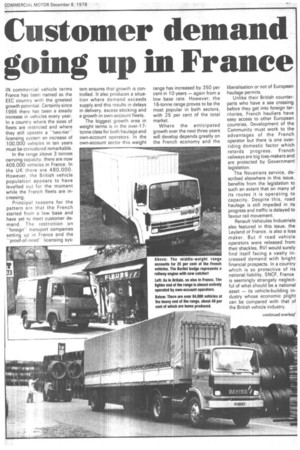Customer demand going up in France
Page 39

If you've noticed an error in this article please click here to report it so we can fix it.
IN commercial vehicle terms France has been named as the EEC country with the greatest growth potential. Certainly since 1966 there has been a steady increase in vehicles every year. In a country where the sizes of fleets are restricted and where they still operate a "two-tier" licensing system an increase of 100,000 vehicles in ten years must be considered remarkable.
In the range above 3 tonnes carrying capacity, there are now 409,000 vehicles in France. In the UK there are 480,000. However, the British vehicle population appears to have levelled out for the moment while the French fleets are increasing.
Principal reasons for the pattern are that the French started from a low base and have yet to meet customer demand. The restriction on "foreign" transport companies setting up in France and the "proof-of-need" licensing sys
tern ensures that growth is controlled. It also produces a situation where demand exceeds supply and this results in delays in delivery, excess stocking and a growth in own-account fleets.
The biggest growth area in weight terms is in the over-17tonne class for both haulage and own-account operators. In the own-account sector this weight range has increased by 350 per cent in 10 years — again from a low base rate. However, the 16-tonne range proves to be the most popular in both sectors, with 25 per cent of the total market.
Where the anticipated growth over the next three years will develop depends greatly on the French economy and the liberalisation or not of European haulage permits.
Unlike their British counterparts who have a sea crossing before they get into foreign territories, French hauliers have easy access to other European countries. Development of the Community must work to the advantages of the French operator but there is one overriding domestic factor which retards progress. French .railways are big loss-makers and are protected by Government legislation.
The Novatrans service, de-. scribed elsewhere in this issue, benefits from the legislation to such an extent that on many of its routes it is operating to capacity. Despite this, road haulage is still impeded in its progress and traffic is delayed to favour rail movement.
Renault Vehicules lndustriels also featured in this issue, the Leyland of France, is also a loss maker. But if road vehicle operators were released from their shackles, RVI would surely find itself facing a vastly increased demand with bright financial prospects. In a country which is so protective of its national liability, SNCF, France is seemingly strangely neglectful of what should be a national asset — its vehicle-building industry whose economic plight can be compared with that of the British vehicle industry.
































































































































